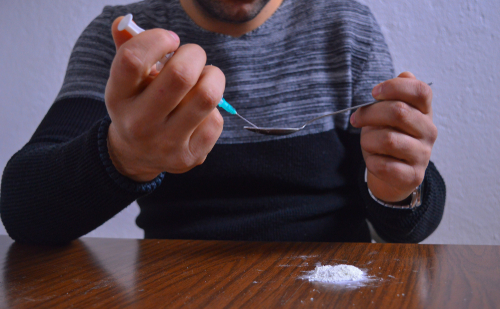Meth Addiction: The Dangers of Shooting Meth
Methamphetamine addiction is a profoundly challenging and dangerous condition that can lead individuals to engage in various methods of consumption, including the hazardous practice of shooting meth. Intravenous injection of methamphetamine, often referred to as ‘shooting up,’ is considered one of the most dangerous ways to use this potent stimulant drug. This method not only carries the risk of addiction and severe physical and psychological health consequences associated with meth use but also introduces additional hazards related to the act of injection itself.
In this article, we will discuss the dangers of shooting meth by understanding meth addiction, how individuals may use meth, the differences between the methods of consumption, and why an individual may want to shoot meth.
What is Meth Addiction?
Methamphetamine addiction is a severe and challenging substance use disorder known by the compulsive and uncontrollable use of meth, a potent and highly addictive central nervous system stimulant. Methamphetamine is known by various street names, including meth, crystal meth, ice, and crank. This addiction can have devastating consequences on an individual’s physical, psychological, and social well-being.
Meth is a synthetic drug that belongs to the amphetamine classification. Meth affects the brain and body by increasing the release of dopamine, a neurotransmitter associated with the brain’s reward system and pleasure. This surge in dopamine creates intense feelings of euphoria and reinforces drug-taking behavior, as the individuals want to keep feeling the same level of ‘high.’ As individuals continuously engage in meth use, they may develop a tolerance to meth, requiring them to use larger doses and other methods of consumption to feel the same effects.

How Can You Use Meth?
There are many different forms of meth, resulting in various ways to use meth, including smoking, snorting, injecting, or taking it by mouth. These various methods of consumption can lead to varying levels of the effects of meth.
When you smoke or inject methamphetamine, it gets into your bloodstream and brain very quickly. This causes a sudden and intense feeling of pleasure, which can make the drug more addictive and harmful. This intense feeling, referred to as a ‘rush,’ only lasts a few minutes but causes the individual to seek out the same intensity continuously. On the other hand, when an individual snorts or swallows meth, it still creates the feelings of pleasure, but the high isn’t as intense. Snorting takes 3 to 5 minutes to work, while swallowing takes 15 to 20 minutes.
Like many stimulant drugs, meth is often used in a ‘bingeing and crashing pattern.’ This means individuals use the drug repeatedly to keep feeling good, even as the pleasurable effects wear off. Sometimes, this leads to a dangerous practice called a ‘run,’ where individuals go without food and sleep for several days while taking the drug. This behavior can have severe physical and mental health consequences.
Learn More: How Long Does Meth Stay in Your System? And Everything Else You Need to Know
What Are the Dangers of Smoking, Snorting, or Shooting Meth?
Using methamphetamine, regardless of the method of consumption, poses significant dangers to one’s physical and mental health and overall well-being. While the specific methods of consumption may cause specific side effects, there are some common effects of meth abuse, no matter how the individual uses it. These side effects can affect an individual in the short term as well as in the long term. Some of the most common short-term side effects of meth use include:
- Intense euphoria
- Increased heart rate
- Decreased appetite resulting in excessive weight loss
- Insomnia
- Dilated pupils
- Irritability or violent behavior
- Paranoia
- Increased body temperature
Some of the most common long-term side effects include:
- Dental problems such as gum disease, tooth loss, or tooth decay
- Increased risk of mental health disorders such as anxiety or depression
- High blood pressure
- Memory loss
- Skin problems such as sores or acne
- Social problems within relationships or jobs
- Psychosis
- Dependency or addiction

Smoking Meth
Smoking methamphetamine produces a rapid and intense high characterized by euphoria and increased energy. However, this high is often followed by a swift crash, leading to fatigue, irritability, and depression. Moreover, smoking meth exposes the lungs to harmful chemicals, potentially causing respiratory issues, chronic coughing, and lung infections. This method of consumption is notorious for dental problems, known as ‘meth mouth,’ due to the drug’s acidic nature and reduced saliva production. Psychologically, smoking meth can worsen mental health issues, including paranoia, anxiety, hallucinations, and aggressive behavior. Additionally, the process of heating the drug can lead to burns and accidents, adding to the dangers associated with smoking meth.
Read More: The Dangers of Secondhand Meth Smoke Exposure
Snorting Meth
Snorting methamphetamine can result in nasal and sinus damage, leading to problems like nosebleeds, persistent congestion, and the deterioration of the nasal septum. There is an increased risk of infection when individuals share snorting paraphernalia such as straws or rolled bills, potentially exposing themselves to bloodborne diseases like HIV and hepatitis. Additionally, the corrosive nature of the drug can irritate the mucous membranes in the nose and throat, causing chronic soreness and discomfort.
Shooting Meth
Injecting methamphetamine, also known as shooting meth, carries an increased risk of addiction because it rapidly delivers the drug into the bloodstream, producing an intense and immediate high. However, this method also poses serious health problems. Repeated injections can lead to vein damage, causing collapsed veins and the potential for infections, mainly when unclean needles or injection equipment are used, creating a high risk of diseases like HIV and hepatitis. Additionally, improper injection techniques or missed injections can result in skin abscesses, cellulitis, and tissue necrosis at the injection sites. Furthermore, there is an increased risk of meth overdose, as users may struggle to control the exact dosage, potentially leading to life-threatening symptoms such as cardiac arrest and seizures.

Why Would Someone Shoot Meth?
Due to the dangerous nature of intravenous drug use, some individuals may wonder, “Why would someone shoot meth?” This question may arise, especially after knowing there are other ways to use meth, although none of them are safe, that do not involve using syringes. Some of the reasons an individual may feel compelled to begin shooting meth may include:
- Chasing the First High: Many individuals who use meth start with less potent methods of consumption, such as snorting or smoking. Over time, they may develop tolerance, requiring larger amounts of the drug to achieve the same effects. Injecting meth allows them to recapture the initial euphoria they experienced.
- Peer Pressure: Individuals are sometimes influenced by their social circles and may start injecting meth because their friends or loved ones do so. Social pressure and the desire to fit in can lead to this choice.
- Escaping Reality: Some individuals use meth to self-medicate for emotional pain, trauma, or mental health issues. The intense rush provided by injecting meth can offer temporary relief from emotional distress. This euphoria provides individuals with a means to escape their reality and a way to cope with any distressing situations.
- Compulsion: As addiction progresses, individuals may feel compelled to use meth in any way possible to avoid withdrawal symptoms and the accompanying physical and mental health problems. This desperation can lead to riskier methods of consumption, such as injection.
Meth Addiction Treatment Available at Louisville Recovery Center
If an individual has begun to shoot meth, they may be experiencing a meth addiction. Meth addiction can cause severe damage to an individual’s life, and it is imperative to receive treatment for this condition as soon as possible. Individuals should begin their treatment with a meth detox conducted at an addiction treatment center to be monitored by medical professionals. Many treatment facilities offer this service and other treatment services to ensure individuals go towards the path of sobriety.
At Louisville Recovery Center, our innovative addiction treatment programs are holistic, experiential, and individualized to ensure we treat every aspect of addiction. Our many programs support holistic recovery by providing various behavioral and experiential therapies, medication-assisted treatment, and nutritional assistance. By doing so, our client receive the best resources and support possible during their recovery journey.
If you or a loved one are suffering from substance abuse or meth addiction, contact us today to learn more about our treatment programs.







